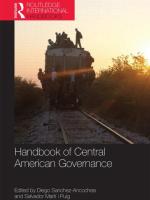Central American governance, globalization and democratization
Central America constitutes a fascinating case study of the challenges, opportunities and characteristics of the process of transformation in today’s global economy. Comprised of a politically diverse range of societies, the region has long been of interest to students of economic development and political change.
A new “Handbook of Central American Governance”, edited by Diego Sanchez-Ancochea and Salvador Martí Puig, aims to describe and explain the manifold processes that are taking place in Central America that are altering patterns of social, political and economic governance, with particular focus on the impact of globalization and democratization. Containing sections on topics such as state and democracy, key political and social actors, inequality and social policy and international relations, in addition to in-depth studies on five key countries (Costa Rica, Nicaragua, El Salvador, Honduras and Guatemala), the handbook is composed of contributions from some of the leading scholars in the field.
Senior researcher Ninna Nyberg Sørensen’s chapter “Central American Migration, Remittances and Transnational Development” evaluates historic and current migration patterns in the region and pays particular attention to the constant blend of politically and economically motivated migrations. Shorter sections describe the particularities of respectively Salvadoran, Guatemalan, Honduran and Nicaraguan migration. By way of conclusion the chapter discusses differences in the four countries’ outreach policies and attempts at establishing transnational governance structures.
DIIS Experts


